Improving the drought tolerance of pearl millet
November 14, 2022
Today at COP27 the focus of discussions is on water. Ensuring agricultural crops are resilient to drought, especially in the face of climate change is a huge undertaking but extremely important. Our researchers are investigating ways to make pearl millet more drought tolerant and ensure nutrient uptake. Pearl millet is a key crop that contributes significantly …
Soils and decarbonisation: What future for agriculture?
November 11, 2022
It is decarbonization day at COP27 today. One of the ways to reduce carbon is capturing it in the soil. Soils are hugely important for our futures here on this planet. But how do soils capture carbon? And how can we develop agricultural practices that better support carbon sequestration in soils? In this post, Malcolm …
Next Generation X-ray Computed Tomography system awarded to UoN Hounsfield Facility, boosting soil research capacity
September 27, 2022
Soils represent a major store of global carbon, much more so than that held in vegetation or the atmosphere. However, this reservoir of soil organic carbon (SOC) is highly susceptible to destabilisation and loss, leading to declines in soil health, loss of biodiversity, and nutrient capital, and the release of harmful greenhouse gases (GHGs). We …
Understanding plant-microbiota interactions: An interview with Katerina Velchova.
June 15, 2022
Katerina Velchova is a PhD candidate in the Graduate Centre for International Agriculture. Their research project is titled: Microbiome-root-shoot axis: A microbial approach for heavy metalloids toxicity in plant systems, and they are supervised by Dr Gabriel Castrillo. Why did you decide to do a PhD? What were you doing before? Previously I completed an …
Swift: A ten minute coffee with Dr Gabriel Castrillo
May 9, 2022
Dr Gabriel Castrillo is an Associate Professor in Plant Microbiomes and a member of the Future Food Beacon, where he started out as a Nottingham Research Fellow. Tell us about your research in 10 words or less… I examine plants interactions with microbes in the area of nutrition. Now, explain your research for a lay …
Swift: A ten minute coffee with Prof Malcolm Bennett
December 8, 2021
Malcolm Bennett is a Professor of Plant Science and a member of the Future Food Beacon leadership team. He was recently recognised as one of the most Highly Cited Researchers 2021 by Clarivate Analytics (based on data from Web of Science). Tell us about your research in 10 words or less… Futureproofing crops by discovering …
The growing power of the rhizotrons! – An interview with Dr Jonathan Atkinson
April 30, 2021
Dr Jonathan Atkinson is a Senior Research Fellow, Technologist in Phenomics, and co-founder of the Future Food Beacon’s Makerspace. He stars in our new video Future Food: an introduction to the Makerspace, which we highly recommend that you watch! In this blog, we ask why and how Dr Atkinson designed and built his largest creations …
Exploring diversity in pearl millet seed – An interview with Brighton Gapare
February 12, 2021
Brighton Gapare is a joint Nottingham-Rothamsted PhD Student 2019–2023. His project is entitled ‘Exploring genetic diversity in grain structure, composition and functionality of pearl millet germplasm’. His supervisors are Dr. Rahul Bhosale (UoN), Prof. Malcom Bennett (UoN) and Prof. Peter Shewry (RRes). He also works with Dr Neil Graham (UoN), Prof. David Cook (UoN), Prof. …
Root growth in a complex microbiome – Dr Gabriel Castrillo’s paper in Nature
October 5, 2020
This blog celebrates the achievement of our very own Dr. Gabriel Castrillo in becoming co-first author on a paper in the leading journal, nature. Everybody at The Future Food Beacon takes delight in seeing Gabriel’s work going from strength to strength. His new paper is called A single bacterial genus maintains root growth in a …
Understanding plant microbe interactions
July 29, 2020
Dr Gabriel Castrillo is a Nottingham Research Fellow whose research focuses on the definition of the molecular mechanisms of plant-microbe interactions. He has won funding from The Leverhulme Trust, the Royal Society and recently, a joint award from the BBSRC (UK) and the National Science Foundation (US) in collaboration with colleagues from the University of …

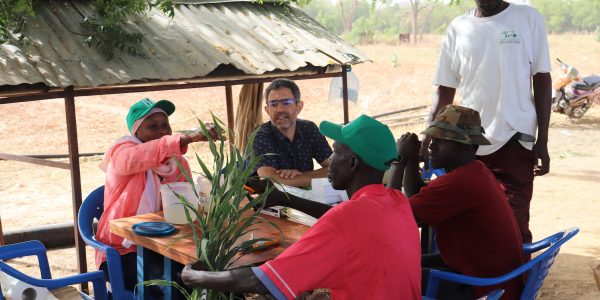
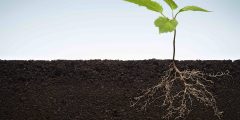
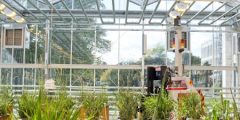
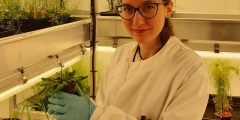

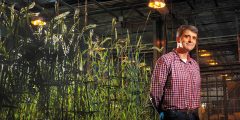
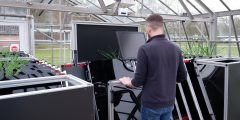


Recent Comments